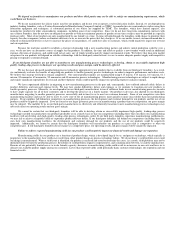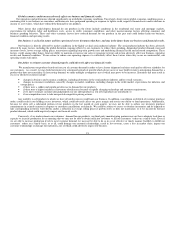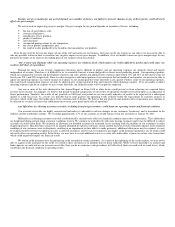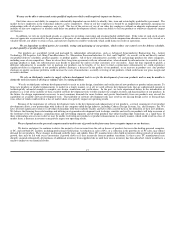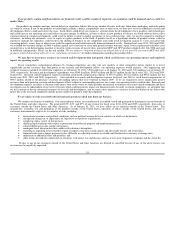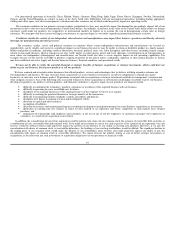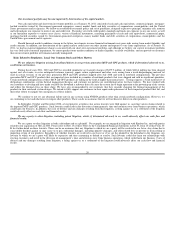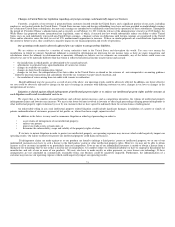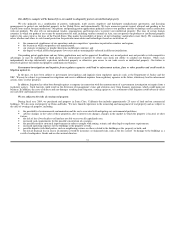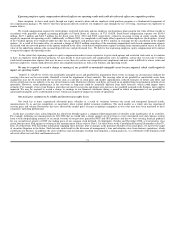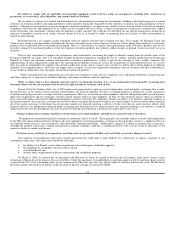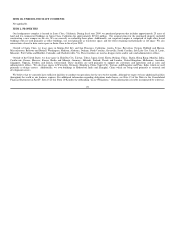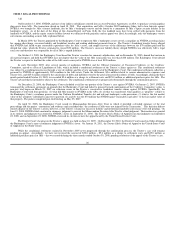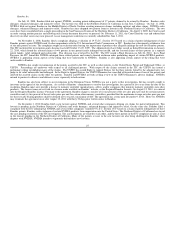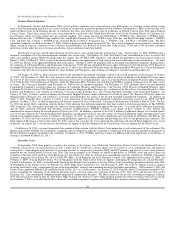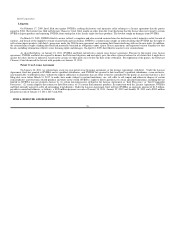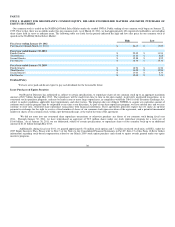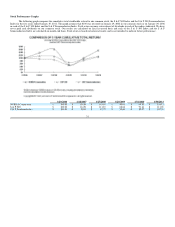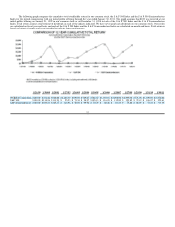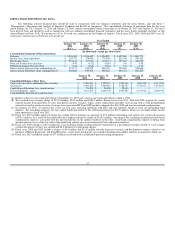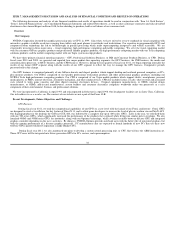NVIDIA 2011 Annual Report Download - page 26
Download and view the complete annual report
Please find page 26 of the 2011 NVIDIA annual report below. You can navigate through the pages in the report by either clicking on the pages listed below, or by using the keyword search tool below to find specific information within the annual report.
Our failure to comply with any applicable environmental regulations could result in a range of consequences, including fines, suspension of
production, excess inventory, sales limitations, and criminal and civil liabilities.
We are subject to various state, federal and international laws and regulations governing the environment, including restricting the presence of certain
substances in electronic products and making producers of those products financially responsible for the collection, treatment, recycling and disposal of those
products. Although our management systems are designed to maintain compliance, we cannot assure you that we have been or will be at all times in complete
compliance with such laws and regulations. If we violate or fail to comply with any of them, a range of consequences could result, including fines, import/
export restrictions, sales limitations, criminal and civil liabilities or other sanctions. We could also be held liable for any and all consequences arising out of
exposure to hazardous materials used, stored, released, disposed of by us or located at, under or emanating from our facilities or other environmental or
natural resource damage.
Environmental laws are complex, change frequently and have tended to become more stringent over time. For example, the European Union and
China are two among a growing number of jurisdictions that have enacted in recent years restrictions on the use of lead, among other chemicals, in electronic
products. These regulations affect semiconductor packaging. There is a risk that the cost, quality and manufacturing yields of lead-free products may be less
favorable compared to lead-based products or that the transition to lead-free products may produce sudden changes in demand, which may result in excess
inventory.
There is also a movement to improve the transparency and accountability concerning the supply of minerals coming from the conflict zones of the
Democratic Republic of Congo. New U.S. legislation includes disclosure requirements regarding the use of “conflict” minerals mined from the Democratic
Republic of Congo and adjoining countries and procedures regarding a manufacturer’s efforts to prevent the sourcing of such “conflict” minerals. The
implementation of these requirements could affect the sourcing and availability of minerals used in the manufacture of semiconductor devices. As a result,
there may only be a limited pool of suppliers who provide conflict free metals, and we cannot assure you that we will be able to obtain products in sufficient
quantities or at competitive prices. Also, since our supply chain is complex, we may face reputational challenges with our customers and other stockholders if
we are unable to sufficiently verify the origins for all metals used in our products.
Future environmental legal requirements may become more stringent or costly and our compliance costs and potential liabilities arising from past
and future releases of, or exposure to, hazardous substances may harm our business and our reputation.
While we believe that we have adequate internal control over financial reporting, if we or our independent registered public accounting firm
determines that we do not, our reputation may be adversely affected and our stock price may decline.
Section 404 of the Sarbanes-Oxley Act of 2002 requires our management to report on, and our independent registered public accounting firm to audit,
the effectiveness of our internal control structure and procedures for financial reporting. We have an ongoing program to perform the system and process
evaluation and testing necessary to comply with these requirements. However, the manner in which companies and their independent public accounting firms
apply these requirements and test companies’ internal controls remains subject to some judgment. To date, we have incurred, and we expect to continue to
incur, increased expense and to devote additional management resources to Section 404 compliance. Despite our efforts, if we identify a material weakness in
our internal controls, there can be no assurance that we will be able to remediate that material weakness in a timely manner, or that we will be able to maintain
all of the controls necessary to determine that our internal control over financial reporting is effective. In the event that our chief executive officer, chief
financial officer or our independent registered public accounting firm determine that our internal control over financial reporting is not effective as defined
under Section 404, investor perceptions of us may be adversely affected and could cause a decline in the market price of our stock.
Changes in financial accounting standards or interpretations of existing standards could affect our reported results of operations.
We prepare our consolidated financial statements in conformity with U.S GAAP. These principles are constantly subject to review and interpretation
by the SEC and various bodies formed to interpret and create appropriate accounting principles. A change in these principles can have a significant effect on
our reported results and may even retroactively affect previously reported transactions. Additionally, changes in existing accounting rules or practices,
including the possible conversion to unified international accounting standards, could have a significant adverse effect on our results of operations or the
manner in which we conduct our business.
Provisions in our certificate of incorporation, our bylaws and our agreement with Microsoft could delay or prevent a change in control.
Our certificate of incorporation and bylaws contain provisions that could make it more difficult for a third party to acquire a majority of our
outstanding voting stock. These provisions include the following:
• the ability of our Board to create and issue preferred stock without prior stockholder approval;
• the prohibition of stockholder action by written consent;
• a classified Board; and
• advance notice requirements for director nominations and stockholder proposals.
On March 5, 2000, we entered into an agreement with Microsoft in which we agreed to develop and sell graphics chips and to license certain
technology to Microsoft and its licensees for use in the Xbox. Under the agreement, if an individual or corporation makes an offer to purchase shares equal to
or greater than 30% of the outstanding shares of our common stock, Microsoft may have first and last rights of refusal to purchase the stock. The Microsoft
provision and the other factors listed above could also delay or prevent a change in control of NVIDIA.
24


